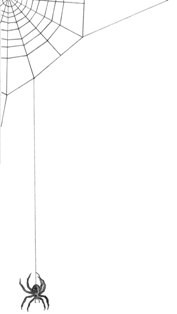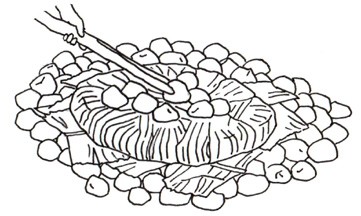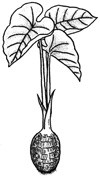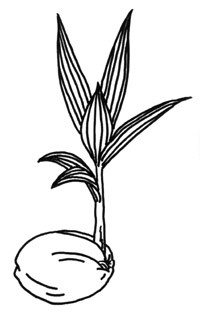
‘spider’
P - p
pa [pa] asp. 1 • [preceded by other clauses] Sequential aspect: indicates a necessary relationship between two events, either in time or logical; mode de la succession immédiate, de l'implication exclusive entre deux relations prédicatives; valeur d'inceptif.
▪ Nam sovi naivou-ku r̄o vara jo sle mara variri lo hanhan, par̄ahu kam̈a pa v̈a lo maket. ‘I'm waiting for my wife to feed the kids, then we shall go to the market.’ ‘J'attends que ma femme ait donné à manger aux enfants, ensuite nous irons au marché.’
▪ Nanovi, nam re na v̈a na r̄ai r̄e viha; mo je r̄e rip̈a, nam pa je v̈a. ‘Yesterday I wanted to go and cut some wood; but I didn't have an axe, so I didn't go.’ ‘Hier, je voulais aller couper du bois ; mais comme je n'avais pas de hache, je n'y suis pas allé.’
2 • [in an independent clause] contrastive focus on time: (V happened) at that specific moment, never before nor after.
▪ Nam pa lesi r̄asi-m keskesi. ‘I am seeing your younger brother for the first time.’
3 • [+ Irrealis] Future reference, e.g. in a promise or a prediction.
▪ Nija jo pa han r̄e sa? ‘What are we going to eat?’ ‘Qu'allons-nous manger ?’
▪ Na pa lahi pong r̄olu. ‘I will marry in three days' time.’
▪ Vara mo sivo lo pere vosa, nko ha pa nak-i-ko ha pa hani-ko. ‘If (the reed) falls on to a Terminalia tree, (this is the sign that) they will kill you, they will eat you.’
▪ Jom̈i-m jo pa te, nko pa r̄aju tilavono. ‘You will lose the joy of living, you will be a wretched man.’ ‘Tu perdras le plaisir de vivre [ta pensée sera mauvaise], tu seras un homme misérable.’
▪ Kam̈am povi kam kila r̄o m̈ar̄a in-r̄e-pongi o pa le m̈a Raki. ‘All of us here we hope that one day you will come back to Araki.’ ‘Nous tous, nous espérons qu'un jour tu reviendras à Araki.’
palaho [palaho] n. k.o. banyan; sorte de banian. Ficus.
► See: vi-p̈aka.
palaho hana m̈aji n. Ficus wassa. k.o. banyan.
palaho pupui n. Ficus granatum. k.o. banyan; sorte de banian.
◈ Etym. <°balako.
paliha~ [paliha] ni.
1 • [Ego M] father-in-law, wife's father; [Ego H] beau-père, père de l'épouse.
▷ For Ego F, the husband's father is called as a grandfather (tapu~).
▷ Une femme désigne son beau-père comme son grand-père (tapu~).
► See: ve-paliha ‘mother-in-law’ ‘belle-mère’.
2 • [Ego M/F] son-in-law, daughter's husband; [Ego H/F] gendre, époux de la fille.
◈ Etym. *bwalika ‘affine’.
pallaje [pallatɕe] n. sea coral; corail de mer.
▪ Mo sivo mo nur lo r̄asi, mo sivo mo var̄i-a pallaje. ‘He ran down the slope and dived into the sea, looking for coral.’ ‘Il dévala la pente et plongea dans la mer, où il alla chercher du corail.’
◈ Etym. *laz(e,i) ‘coral’; *laje.
pange [paŋe] ni. belly, stomach; ventre, estomac.
► See: r̄anga ha~ ‘stomach’ ‘estomac’.
◈ Etym. *bwaŋe.
pana [pana] adv. ~ p̈ana. [placed before the sentence focus] maybe, probably; peut-être, sans doute.
▪ R̄aju mo hese mo karumi-a laho vinini, mo re pana jau. ‘Somebody was there, scraping the trunk of the palmtree – no doubt a coconut crab, he thought.’ ‘Quelqu'un était là, qui grattait le tronc du palmier – sans doute un crabe de cocotier, pensa-t-il.’
▪ Mo je rongo ha le sivo Raki mo re m̈ar̄a pana ha jolo lo r̄asi. ‘They no longer want to go to Araki because they say they might drown in the sea.’ ‘Ils ne veulent plus se rendre à Araki car, disent-ils, ils risquent de se noyer en mer.’
► See: korongo.
pani [pani] conj. but, however. Usually expresses a logical contrast between two clauses; mais.
▪ Nam varai kam̈im nam re ha v̈a hojo lim̈a-m̈im, pan lim̈a-m̈im mo viriha r̄o. ‘I told you to wash your hands, but they are still black!’ ‘Je vous avais dit d'aller vous laver les mains, mais elles sont encore noires !’
▪ Nam re na var̄i-a suka, pan nam petepete. ‘I would like to take the sugar, but I am too short!’ ‘Je veux attraper le sucre, mais je ne suis pas assez grand.’
▪ Jam je levse lesi-a, pani nia mo r̄oho r̄o. ‘We cannot see him, yet he exists.’ ‘On ne peut pas le voir, mais pourtant il existe.’
paniavu [paniaβu] n. pineapple; ananas. Ananas sativus.
▪ Nam ejene paniavu r̄o. ‘I sell pineapples.’ ‘Je vends des ananas.’
 |
| para ‘spider’ |
pao [pao] n. Purple Swamphen, 36 cm; Poule sultane, 36 cm. Porphyrio porphyrio.
para1 [paɾa] ni. white hair, esp. due to age; cheveux blancs.
◆ vi. [hair] be white; [person] have white hair, be white-haired, due to age; avoir les cheveux blancs.
▪ Vulu-ra mo para. ‘Their hair is white.’ ‘Ils ont les cheveux blancs.’
▪ Nam r̄e para mo iso. ‘I am already white-haired.’
para2 [paɾa] n. spider; araignée.
▪ Nam je opo-i-ra para. ‘I don't like spiders.’
paro [paɾo] adj. 1 • [fruit] green, unripe; raw, uncooked; [fruit] vert, pas mûr, cru, pas cuit.
▪ Nam poe nam re na voli r̄e v̈er̄ali paro. ‘I want to buy some green bananas.’ ‘Je veux acheter des bananes pas mûres.’
► Ant: m̈ena.
2 • new, incredible; nouveau, inouï.
◈ Etym. *bwaro.
par̄a [para] ni. trunk of a tree; hence the tree itself, vs. its fruits (vae), or its other parts (see vi-ha); tronc.
▪ Par̄a levu mo hese mo r̄uru lo sala. ‘There is a (trunk of) breadfruit tree standing along the road.’
▪ par̄a-na ‘its trunk’.
► Syn: laho.
par̄ahu [parahu] adv. after, afterwards; après, ensuite.
▪ Nam sovi naivou-ku r̄o vara jo sle mara variri lo hanhan, par̄ahu kam̈a pa v̈a lo maket. ‘I'm waiting for my wife to feed the kids, then [lit. after that] we shall go to the market.’ ‘J'attends que ma femme ait donné à manger aux enfants, ensuite nous irons au marché.’
► Syn: m̈ar̄a.
naivou(-ku) par̄ahu ni. second wife; seconde épouse.
► Syn: naivou~ v̈aha-rua.
◈ Etym. *takuʀu.
 |
| pasule ‘traditional stone oven’ |
par̄iavu [pariaβu] n. ashes; cendres.
◈ Etym. batui-avu ‘ashes’; *avu ‘ashes, lime, dust’; *qapu.
par̄u [paru] ni. [hum, animal] head; tête.
▪ Mo var̄i-a no-no m̈aja, mo vjan-i-a lo par̄u-na. ‘He seized his club, and smashed her head with it.’ ‘Il saisit sa massue, et lui fracassa la tête avec.’
▪ Par̄u haur̄a! ‘You stubborn / naughty! [lit. hard head]’. ‘tête de lard !’
▪ p̈is par̄u po ‘thumb [lit. pig's head finger]’.
◈ Etym. *bwatu.
Pasta [Pasta] n. pastor, Anglican priest; pasteur, prêtre anglican.
◈ Borrowed from pastor.
pasule [pasule] n. traditional oven using stones (sule voso); four traditionnel à pierres (cf. sule voso).
► See: hapu ‘fire’.
pau [pau] ni. knee; genou.
▪ pau-ku ‘my knee(s)’.
► See: sari.
◈ Etym. *bwau.
paua [paua] n. power, esp. occult or sacred power; puissance, pouvoir, partic. pouvoir occulte ou sacré.
▪ Kesi jara nosun r̄aju mo r̄oho kia ha, mo r̄e je r̄e no-no paua. ‘Today, people live there, because its power (that of the bewitched tree) has disappeared.’ ‘Aujourd'hui, il y a des gens qui habitent à cet endroit, car son pouvoir (de l'arbre ensorcelé) a disparu.’
▪ Paua no-n God mo jeu-a, mo jeu-a paua no-n Setan. ‘The power of God is stronger, stronger than the power of Satan.’ ‘Le pouvoir de Dieu est plus fort, plus fort que le pouvoir de Satan.’
◈ Borrowed from power.
pavu [paβu] n. Flametail snapper, Bisl. Jone: reef fish, 48 cm; Lutjan fauve (angl. Flametail snapper), poisson récifal, 48 cm.
pavu ra-tavoa n. Humpback snapper, Bisl. Pinkfis: reef fish, 45 cm; Lutjan bossu (angl. Hump back snapper), poisson récifal, 45 cm. Lutjanus gibbus. Its name suggests leaves (ra-) of Terminalia (see vosa).
▷ Son nom le compare aux feuilles (ra-) de Terminalia (Cf. vosa).
◈ Etym. *tavoʀa ‘Terminalia’.
peka [peka] n. Barn Owl, 34 cm; Effraie des Clochers, sorte de chouette, 34 cm. Tyto alba.
pele [pele] asp. [between Subject and Verb] take o.'s turn (in doing s.th.); hence while, whereas; (faire qqch) à son tour, en alternance avec qqn d'autre; Cf. tandis que. S'insère entre le pronom sujet et le verbe.
▪ R̄e jo pele sna jo holo aka! ‘Let someone come and (take my place to) man the boat!’ ‘Que quelqu'un vienne diriger le navire (à son tour) !’
▪ Ale o sna, o pele o le var̄i-a jara-m, na na si na pele hanhan. ‘Okay, come; while you come back to your place, I will go and have lunch.’ ‘Allez, viens: tandis que toi tu reprends ton poste, moi je descends manger.’
peli [peli] ni. dwelling place, usual place of (s.o.); endroit où habite quelqu'un, lieu habituel.
lo peli~ npr. at (s.o.)'s place; chez (qqn).
▪ Na v̈a na hanhan lo peli-n pua. ‘I'm going to eat at my mother's.’ ‘Je vais manger chez ma mère.’
pelo [pelo] n. traditional slit gong; tambour fendu traditionnel.
◈ Etym. *bwea (?) ‘slitgong, drum’.
pere [peɾe] ni. [tree, mountain] top, summit; cime, sommet (arbre, montagne).
▪ lo pere vosa ‘at the top of a Terminalia’. ‘au sommet d'un Terminalia’.
▪ lo pere p̈aka ‘at the top of a banyan tree (vi-p̈aka)’. ‘au sommet d'un banian (vi-p̈aka)’.
▪ Jo pa v̈ei-a ai jo wet-i-a as jo pa sihevi nia jo sa lo pere vinini jo pa var̄i-a jau kia. ‘He will wet the rope, and then climb up to the top of the palmtree with it to catch the coconut crab.’ ‘Il mouillera la corde, puis grimpera avec au sommet du palmier, pour attraper le crabe de cocotier.’
perepere ni. heights, promontory above [sea+]; hauteur, promontoire au-dessus de (mer +).
▪ Nia mo r̄oho r̄o lo perepere r̄asi, r̄avui lo r̄asi. ‘She lived on the heights above the sea’. ‘Elle habitait sur les hauteurs de la mer, au bord de la mer.’
peresi~ [peɾesi] vpr. ~ p̈eresi~. with, together with <s.o., s.b.>; marks accompaniment rather than instrument; avec.
▪ Nam re na v̈alum p̈eresi-ko. ‘I'm going to fight with you.’ ‘Je veux me battre avec toi.’
▪ Mo m̈ar̄e, huri-na prongo peresi-a sui-na. ‘He was dead, having nothing more than his skin on [lit. with] his bones.’ ‘Il était mort, et n'avait plus que la peau sur les os.’
pereti [peɾeti] n. bread, of European origin, but now produced locally.
▪ Kesi hanhan vutiana: pereti; raisi; hina vutiana, pan r̄uai mo je r̄e hanhan. ‘Nowadays, there is plenty of (different sorts of) food: bread, rice, many things; but in olden times, there was no food (like that).’
◈ Borrowed from bread.
 |
| per̄a ‘taro’ |
peropero [peɾopeɾo] vi. deaf; sourd.
▪ Poro-no mo te, nia mo peropero. ‘He has bad ears, he is deaf.’ ‘Ses oreilles sont défaillantes, il est sourd.’
► See: poro ‘ear’.
◈ Etym. *bwero ‘ear’.
per̄a [pera] n. taro; taro. Colocasia esculenta.
▪ ra-per̄a ‘taro leaf’. ‘feuille de taro’.
▪ juli per̄a ‘taro shoot’. ‘plant de taro’.
▪ Naprongo vara jo usa, pla-m per̄a jo je levse m̈au. ‘Even if it rains, your taro won't be able to grow properly.’ ‘Même s'il pleuvait, ton taro ne pourrait pas se développer. (car tu l'as mal planté...)’.
per̄a tasale n. Xanthosoma sagittifolium. Fiji taro, Hongkong taro; taro Fiji ou taro des Hébrides.
per̄a ai n. k.o. taro cultivated in taro swamps; taro cultivé en tarodière irriguée.
◈ Etym. *bweta.
petepete [petepete] adj. 1 • short; court.
▪ viha petepete ‘a short piece of wood’.
► See: hetehete ‘small’.
► Ant: p̈eravu.
2 • [hum] small, not tall; [hum] petit, en parlant de la taille d'une personne.
▪ Nam re na var̄i-a suka, pan nam petepete. ‘I want to reach the sugar, but I'm not tall enough.’ ‘Je veux attraper le sucre, mais je ne suis pas assez grand.’
3 • [breath] short, breathless, such as in suffocation; [souffle] court, réduit, dans le cas de l'essoufflement ou de l'asphyxie.
▪ Siho mo m̈alokoloko, m̈apu-na mo petepete mo jovi mo m̈ar̄e. ‘The Kingfisher was so exhausted, breathless [his breath was so short], that he collapsed and died.’ ‘Le martin-pêcheur était exténué, complètement suffoqué [son souffle était court], si bien qu'il s'effondra et mourut.’
pevu [peβu] n. k.o. yam; sorte d'igname.
pevu hohono n. k.o. wild yam; igname sauvage. Dioscorea bulbifera.
► See: suma ‘wild yam’.
pilai [pilai] adp. (kill) in one blow, outright; (tuer) d'un coup, violemment.
▪ Mo nak pilai va p̈ir̄a honi mo si mo jolo. ‘He killed the young woman outright, and she sank (to the bottom of the water).’ ‘Il tua d'un coup la jeune femme, qui coula à pic (au fond de l'eau).’
pili [pili] ni. shoulder; épaule.
▪ Huir̄a mo re "Ale, o sna sarai lo pili-ku!" ‘"Okay", said the octopus, "come and sit on my shoulders."’. ‘"D'accord", dit le poulpe, "viens donc t'asseoir sur mes épaules."’.
► See: lim̈a ‘arm, hand’.
pilo [pilo] ni. bald head; crâne dégarni, calvitie.
▪ Nam lesi-a pilo-m mo posi-a m̈ajihi-na mo viriha mo lulu. ‘I was looking at your bald head, changing its colour from black to white.’ ‘Je vois ton crâne qui change de couleur, tantôt sombre et tantôt clair.’
► See: pongor̄i ‘skull’.
pioro [pioɾo] n. sandalwood; bois de santal. Santalum austrocaledonicum.
plane [plane] vt. ~ plan. Tr: plani-. throw, cast; jeter.
▪ Mo var̄i-a sule mo sa kia mo plan-i-a lo jara ri. ‘Each one brings a stone up there, and throws it from that place.’ ‘Il prend une pierre, monte là-haut, puis le lance du haut de cet endroit.’
▪ Mo var̄i-a ra-holo mo plan-i-a kaur̄a hinia. ‘They take coconut palms and throw them over (the breadfruit being stored).’ ‘(après avoir déposé le fruit-à-pain) on prend des palmes de cocotiers et on les jette dessus.’
▪ Na pa sa na pa r̄an-i-a na pa plan-i-a sna. ‘I will climb up, catch it (a coconut crab) and throw it to you.’ ‘Je vais monter l'attraper (le crabe), et puis je te le lancerai.’
po [po] n. pig; cochon.
▪ pula-ku po ‘my pig (I breed)’. ‘mon cochon (que j'élève)’.
▪ ha-ku po ‘my piece of pork (to eat)’. ‘mon porc (que je mange)’.
► See: rave.
◈ Etym. *boe.
poe [poe] vt. ~ opoe. Tr: (o)poei-. 1 • appreciate <s.th.>; like, desire <s.o.>; apprécier (qqch); aimer, désirer (qqn).
▪ Nam po-i Raki vutiana. ‘I like Araki (island) very much.’ ‘J'aime beaucoup (l'île) Araki.’
▪ Nam poe-i-a no-m soro. ‘I like your language.’ ‘J'aime bien ta langue.’
▪ Om re se mo po-i-ko? ‘Who do you think loves you?’ ‘De qui crois-tu être aimé ?’
2 • [+ verb V2; or (+ vara or mo re) + Irrealis] desire, want; désirer, vouloir (que, vara ou mo re + Irréel).
▪ Ta, nam po-i-a vara o r̄ai r̄e aka-ku. ‘Father, I want you to carve me a canoe.’ ‘Père, je voudrais que tu me tailles une pirogue.’
▪ Om poe levse vara m̈auri-m jo pa iso lo sava jara? ‘Do you want to know in what kind of place you will end your life?’
◈ Etym. obo-i-a ‘love him’.
polo1 [polo] vt. light <a fire>; allumer, faire (un feu).
▪ O polo r̄e hap lap̈a! ‘Please light a big fire!’ ‘Allume un grand feu!’
polo2 [polo] n. Siganus doliatus. Pencil-streaked rabbitfish, Bisl. Yelotel-piko: reef fish, 30 cm; Picot cerclé (angl. Pencil-streaked rabbitfish), poisson récifal, 30 cm.
pongi [poŋi] n. ~ pong. 1 • day; jour.
▪ Kam̈am povi kam kila r̄o m̈ar̄a in-r̄e-pongi o pa le m̈a Raki. ‘All of us here we hope that one day you will come back to Araki.’ ‘Nous tous, nous espérons qu'un jour tu reviendras à Araki.’
► Syn: rani.
2 • [+ number] forms adverbial phrases referring to a number of days in the future: 'in (x) days' time'.
▪ pong rua ‘in two days' time, the day after tomorrow’.
▪ pong haualu ‘in eight days' time’.
▪ Na pa lahi pong r̄olu. ‘I will marry in three days' time.’
► See: p̈aivuho ‘tomorrow’.
◈ Etym. *boŋi.
pongor̄i [poŋori] ni. skull, bone of the head; crâne.
► See: pilo ‘bald head’ ‘crâne chauve’.
 |
| popo ‘germinated coconut’ |
pon [pon] n. smell; odeur.
► See: rongo ‘feel, smell’.
pona ni. smell of (s.o., s.th.); odeur de (qqn, qqch).
▪ Pona-m mo holo-ho. ‘Your smell is nice.’ ‘Tu sens bon [ton odeur est bonne]’.
◈ Etym. *bo-n(i,a) ‘smell, scent, odour’.
 |
| pono ‘parrotfish’ |
pono [pono] n. Quoy's parrotfish, Bisl. Blufis: reef fish, 40 cm; Perroquet de Bloch (angl. Quoy's parrotfish), poisson récifal, 40 cm. Scarus blochi.
popo [popo] n. germinated coconut, Bisl. Navara; noix de coco germée, Bisl. Navara. Cocos nucifera.
► See: holo1 ‘coconut’.
poro [poɾo] ni. ear; oreille.
▪ poro m̈arau-ku ‘my left ear’.
▪ Poro-no mo te, nia mo peropero. ‘He has bad ears, he is deaf.’ ‘Ses oreilles sont défaillantes, il est sourd.’
◈ Etym. *bwero.
por̄io [porio] n. grasshopper; sauterelle.
posi1 [posi] ~ pos. vi. 1 • [in navigating] tack, turn, change direction; virer, changer de direction.
▪ Mo le v̈a v̈a sur̄i-a jingo hosun mo sivo mo pos mo v̈a lej. ‘Again he sailed alongside the cape; after a while, he started tacking, and disappeared from the horizon.’ ‘À nouveau, il se mit à longer le cap; au bout d'une certaine distance, il se mit à virer de bord, et disparut à l'horizon.’
2 • change aspect, transform oneself; changer d'aspect, se transformer, être changeant.
▪ Posi-m mo posi. ‘Your character is changing (you are fickle)’. ‘Ton caractère change / est changeant. (tu es inconstant)’.
◆ vt. modify, change <s.o., s.th.>; modifier, changer.
▪ Mo levse posi-a naho rai p̈ir̄a sohe nosun om po-i-a r̄o. ‘(This devil) knows how to transform women's faces into the one you love (in order to attract you).’
▪ Nam lesi-a pilo-m mo posi-a m̈ajihi-na mo viriha mo lulu. ‘I was looking at your bald head, changing its colour from black to white.’ ‘Je voyais ton crâne changer de couleur, tantôt foncé tantôt clair.’
posi2 [posi] ni. fashion, style, typical manner of (s.o.); way, nature; style, manière typique de (qqn); caractère, nature.
▪ Pan nira mo r̄e levsei-a mo re kesi posi-n Spoemalao kesi mo v̈ei-a kesi. ‘But they realised that it was just like Spoemalao [it was his style] to have done such a thing.’ ‘Mais ils reconnurent là que c'était bien le style de Spoemalao d'avoir agi ainsi.’
povi [poβi] adj. ~ pov; po. [affecting the subject] all, everybody; tout.
▪ Kam̈im po ha ngingisa! ‘All of you, please smile!’ ‘Vous tous, faites un grand sourire !’
▪ M̈aji mo avuavu nra povi. ‘The birds all took flight.’ ‘Les oiseaux prirent tous leur envol.’
◆ adp. [affecting the object] (do V) totally, completely; (faire V) entièrement, complètement.
▪ Mo v̈ei povi-a rai hina hosun. ‘He did all those things entirely.’ ‘Il fit entièrement toutes ces choses.’
▪ Mo han-i-a mo han povi-a. ‘He ate it, he ate it all up.’ ‘Il le mangea, il le mangea entièrement.’
▷ Après un verbe, c'est povi qui prend les marques de transitivité. After a verb, the transitivity markers are transferred from the verb to povi.
prongo [pɾoŋo] adv. 1 • just, only; seulement.
▪ Mo m̈ar̄e, huri-na prongo peresi-a sui-na. ‘He was dead, with nothing more than his skin on his bones.’ ‘Il était mort, et n'avait plus que la peau sur les os.’
2 • (remain+) idle, aimless; (rester+) sans rien faire, sans but, en vain.
▪ Na nam r̄oho prongo r̄o. ‘I'll stay here and do nothing.’ ‘Moi, je reste ici à rien faire.’
pua [pua] n. ~ puá. Mum: address term for mother (r̄ar̄na~); maman, mère.
▪ Na v̈a na hanhan lo peli-n puá. ‘I'm going to have lunch at my mum's.’ ‘Je vais manger chez ma mère.’
▪ Na ul r̄e leta jo sivo sa-n pua. ‘I must write a letter to [lit. which should go to] my mother.’
pula~ [pula] pos. ~ pla~. Possessive classifier referring to economical possessions, esp. plants and possessed animals; Classificateur Possessif renvoyant à des possessions de valeur, dans le cadre de l'élevage et de l'agriculture.
▪ pula-ku holo ‘my coconut tree (I planted)’. ‘mon cocotier (que j'ai planté)’.
▪ pula-ku po ‘my pig (which I feed)’. ‘mon porc (que je nourris)’.
▪ Nam v̈ahani-a pla-ku to. ‘I am feeding my fowls.’ ‘Je nourris mes poules.’
pultan [pultan] adp. together, in the same place; ensemble.
▪ Ha huren pultan-i-a par̄um̈im! ‘Put all your heads together!’ ‘Placez tous vos têtes au même endroit !’
puru [puɾu] n. [egg, shellfish] shell; coquille.
▪ puru sile to ‘shell of a (hen's) egg’. ‘une coquille d'œuf [de poule]’.
puru p̈isu~ ni. finger nails; ongles.
◈ Etym. *bura-ti ‘shell, empty container’.
purupuru [puɾupuɾu] n. wood, timber, beam; bois de construction, poutre.
► See: viha ‘wood’.
pur̄o [puro] ni. navel; umbilical cord; nombril, cordon ombilical.
▪ Dokta mo je m̈isi r̄ai-a pur̄o-no. ‘The doctor hasn't yet cut his cord.’ ‘Le médecin ne lui a pas encore coupé le cordon.’
◈ Etym. *buto; *butoŋ.
putu [putu] vi. mad, crazy; fou.
▪ Om putu! ‘You are crazy!’ ‘Tu es fou !’